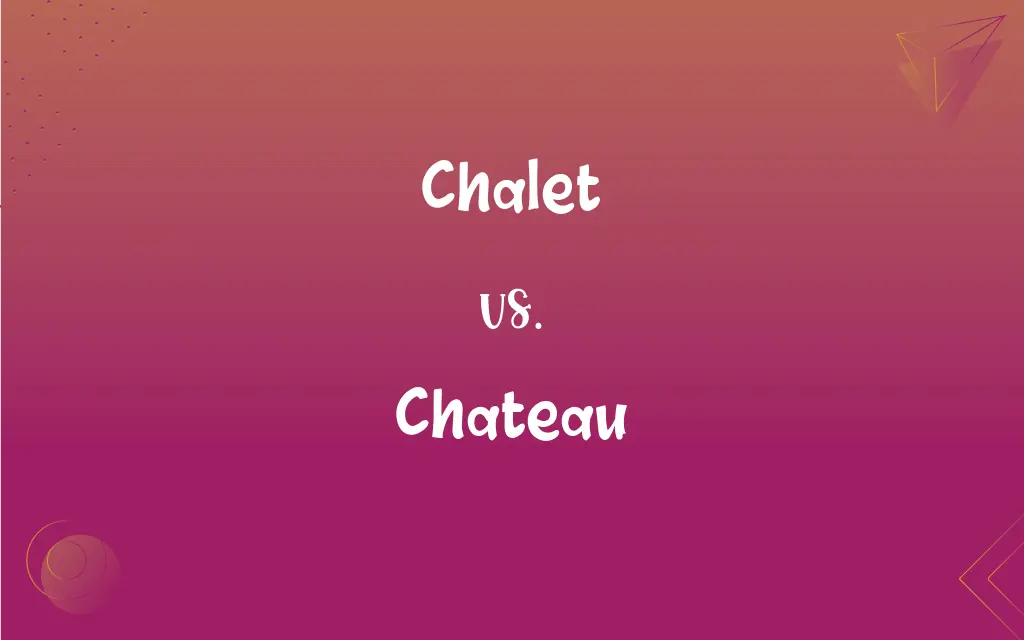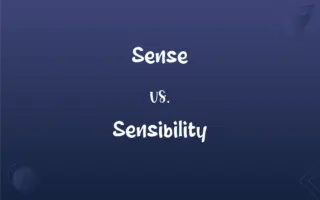Chalet vs. Chateau: What's the Difference?
Edited by Janet White || By Harlon Moss || Updated on November 7, 2023
A chalet is a wooden house with a sloping roof, typical in mountain regions, while a chateau is a large French country house or castle.

Key Differences
A chalet is traditionally a type of wooden house with a heavy, gently sloping roof and wide, well-supported eaves set at right angles to the front of the house. It originated in the Alpine regions as seasonal housing for herders. A chateau, on the other hand, refers to a grand residence or castle in the French countryside, often associated with nobility and surrounded by vineyards or extensive lands.
Chalets are characterized by their rustic, cozy feel and are commonly found in ski resorts and mountain areas. They are designed to withstand heavy snowfalls. Chateaux are recognized for their architectural grandeur, historical significance, and are often part of large estates with expansive grounds.
The term chalet has been adapted in real estate to describe any cottage or lodge, especially one that has a high-pitched roof. Chateaux, meanwhile, have inspired architectural styles beyond France, signifying elegance and wealth, and the term is sometimes used to describe wineries in the New World with grand estates.
Despite their distinct origins, both chalets and chateaux are viewed as desirable accommodations. A chalet typically emphasizes comfort and intimacy, often accommodating guests in a homelike setting. In contrast, staying at a chateau can offer a taste of luxury, heritage, and aristocratic lifestyles.
While both can be used for holiday stays, chalets often cater to vacationers looking for a private, serene getaway, often in snowy or rural settings. Chateaux can serve as venues for events, tours, and wine-tasting sessions, providing a culturally rich experience often tied to the history and traditions of the region.
ADVERTISEMENT
Comparison Chart
Origin
Swiss/German Alpine
French
Structure
Wooden, sloped roof
Stone, often grand
Typical Location
Mountains
Countryside
Use
Seasonal herder house, now vacation home
Residence of nobility, now often a historic site
Size
Generally modest
Large and imposing
ADVERTISEMENT
Chalet and Chateau Definitions
Chalet
Any small, wooden, holiday house, often found in mountainous areas.
The chalet by the lake offered a picturesque escape from the city.
Chateau
A large country house or castle in France.
The vineyards surrounding the ancient chateau were breathtaking.
Chalet
A house in a ski resort, typically made of wood with a sloping roof.
The cozy chalet was the perfect retreat after a day on the slopes.
Chateau
A manor house or residence of nobility in the French-speaking regions.
The chateau has been in his family for centuries, a testament to their noble lineage.
Chalet
An alpine herder's hut or shelter.
The shepherd used the chalet as a refuge during the summer grazing season.
Chateau
A wine-growing estate, especially one in Bordeaux or the Loire Valley.
We toured the chateau's cellars and sampled their finest vintage.
Chalet
A term for any cottage or similar holiday accommodation.
They owned a quaint chalet in the mountains where they would spend their winters.
Chateau
A historical building associated with luxury and wealth.
The chateau was now a museum, open to those wishing to explore its opulent halls.
Chalet
A wooden house with a sloping roof, common in alpine regions.
We rented a chalet in the Swiss Alps for our ski holiday.
Chateau
Buildings styled after French country houses.
The new chateau-style mansion stood out among the local architecture.
Chalet
A wooden dwelling with a low-pitched roof and wide eaves, common in Alpine regions.
Chateau
A castle or manor house in a French-speaking region.
Chalet
A cottage or lodge built in this style.
Chateau
An estate where wine is produced and often bottled, especially in the Bordeaux region of France.
FAQs
What is a chalet?
A chalet is typically a wooden house with a sloping roof, found in mountainous regions.
Do chalets have multiple floors?
Yes, chalets can have multiple floors, often with bedrooms in the loft space.
Are chalets only found in Europe?
No, chalets are found worldwide, particularly in areas with mountainous terrain.
Can a chateau be a small building?
Traditionally, no; chateaux are generally large and stately.
What does chateau mean?
Chateau refers to a grand residence or castle, especially in the French countryside.
What is the plural of chateau?
The plural is chateaux.
Can chalets be used year-round?
Yes, many are built for year-round habitation, though some are seasonal.
Do chateaux have vineyards?
Many do, especially in wine-producing regions like Bordeaux.
What makes a building a chateau?
Size, grandeur, and historical significance typically define a chateau.
Are chalets expensive?
Depending on the location and amenities, chalets can range from modest to luxurious.
Is a chalet always made of wood?
Traditional chalets are wooden, but modern ones can use various materials.
Are all chateaux open to the public?
Not all; some are private residences, while others are museums or hotels.
What's the difference between a castle and a chateau?
Castles are fortified structures, while chateaux are grand residential buildings.
What's the appeal of staying in a chalet?
They offer a cozy, intimate experience often in stunning natural surroundings.
Can you host events at a chateau?
Many chateaux serve as venues for weddings, tours, and other events.
Is a chalet suitable for summer vacations?
Yes, chalets are popular in summer for their mountain location and scenery.
Can you rent a chalet for holidays?
Yes, many chalets are available for holiday rentals.
Why are chateaux important in French history?
They represent the cultural and architectural heritage of France's noble past.
Do chalets have traditional designs?
Yes, they often feature rustic, Alpine motifs and construction methods.
Is a chateau always in a rural setting?
Mostly, though some are now enveloped by urban expansion.
About Author
Written by
Harlon MossHarlon is a seasoned quality moderator and accomplished content writer for Difference Wiki. An alumnus of the prestigious University of California, he earned his degree in Computer Science. Leveraging his academic background, Harlon brings a meticulous and informed perspective to his work, ensuring content accuracy and excellence.
Edited by
Janet WhiteJanet White has been an esteemed writer and blogger for Difference Wiki. Holding a Master's degree in Science and Medical Journalism from the prestigious Boston University, she has consistently demonstrated her expertise and passion for her field. When she's not immersed in her work, Janet relishes her time exercising, delving into a good book, and cherishing moments with friends and family.
































































